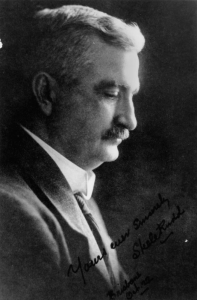Davis was born on 14 November 1868 at Drayton, Queensland, son of Thomas Davis, Welsh blacksmith and selector, and his Irish wife Mary, née Green. Davis began work at the young age of 12 as labour on local properties around Emu Creek. His life took a very different turn when Davis, aged 17, became a clerk for the Curator of Intestate Estates Brisbane Office in 1885. In a few years (188) he was transferred to Sheriff's Office in the Supreme Court. As a public servant Davis not only rose through the ranks but took on diverse roles. In 1893 he was appointed Secretary of a treasury committee investigating the Queensland National Bank. Davis was promoted to the position of Under-Sheriff in 1902, but lost his post under (Sir Arthur) Morgan's Special Retrenchment Act. That ended Davis’ career in the Queensland public service.
It was during his time in the Sheriff's Office, that Davis took on his literary career as Steele Rudd. It is suggested that he may have been influenced by reading he work of Walter Scott, William Thackeray, and Charles Dickens during his lodging with Cecil Boland in Brisbane circa 1889-1894. Davis began writing short pieces, first for the Brisbane Chronicle, and then Bulletin. It was in the Bulletin that Davis’ On Our Selection short pieces appeared from 1895 to 1899. When Davis faced retrenchment in 1904, he formed a company to produce Steele Rudd's Magazine (1903- 1907), which he ran from Sydney until its financial collapse. He and his wife, Violet Davis (nee Brodie), were temporarily saved by meagre royalty payments for the rights to a stage version of On Our Selection. The independence of spirit in his career and financial difficulties led to a slow nervous breakdown for Violet, who in 1919 was permanently hospitalized; the wounding of their son, Gower, at Somme in 1917 also created stress for the Davis family.
By 1913 Davis and the family had returned to Queensland living in the Darling Down region (Davis was Chairman of the Cambooya Shire Council in 1914-1915), and returned to Brisbane in 1917. There Davis was able to revive his literary work as the Steele Rudd's Annual (1917-1923). At this point, Davis reached the height of his career. Davis in 1921 became Vice-President of the newly-formed Queensland Authors' and Artists' Association. The following year (1922) Raymond Longford produced a film version of On Our Selection. With Winifred Hamilton as a sub-editor, Davis a monthly magazine, Steele Rudd's (1924-1925). In 1926, with business difficulties, Davis moved to Sydney again, and the periodical became Steele Rudd's and the Shop Assistants' Magazine. After the failures of other film and stage productions, Davis was living rough. He survived financially through a Commonwealth Literary Fund pension from October 1930, and the charity of others (a benefit performance supported by the Bulletin).
With twenty-four books and six plays and three silent and four sound-film adaptations of his work, Davis, in the nom de plume Steele Rudd, was Australia’s best known writer of the early twentieth century.
See Arthur Hoey Davis on Scatterplot Matrix.
References
Van Ikin, 'Davis, Arthur Hoey (1868–1935)', Australian Dictionary of Biography, National Centre of Biography, Australian National University, http://adb.anu.edu.au/biography/davis-arthur-hoey-5911/text10067, published first in hardcopy 1981, accessed online 6 September 2015.


